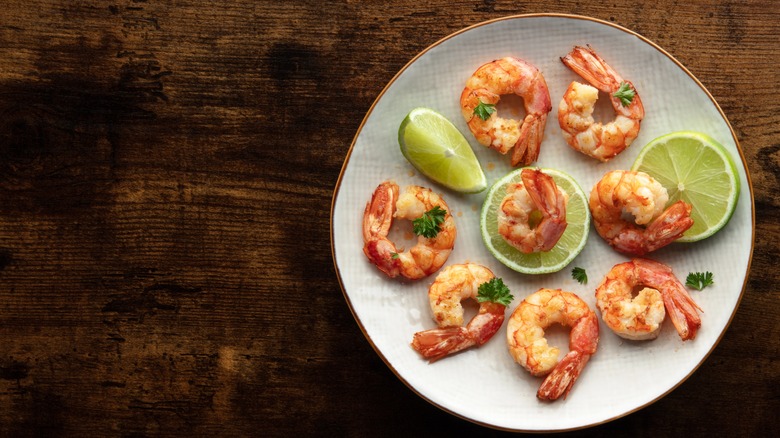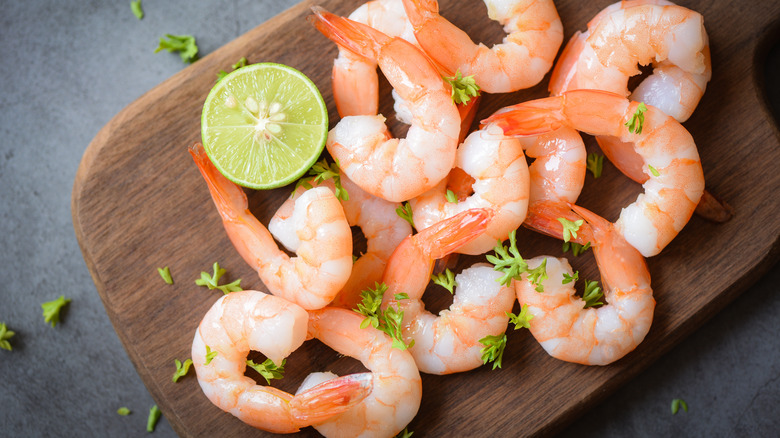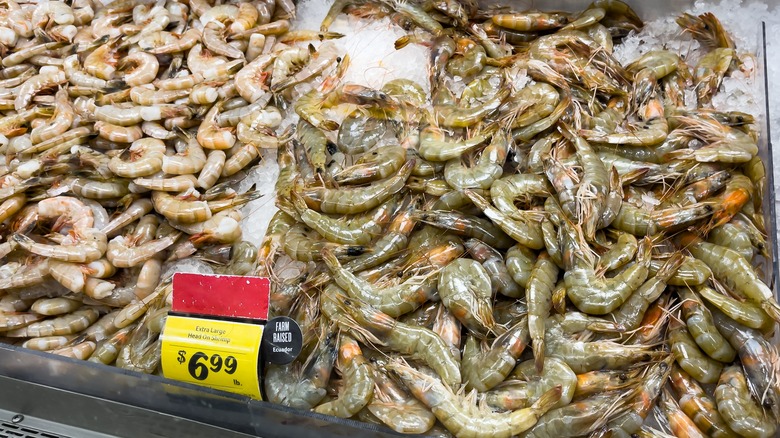The Simple Tricks To Eliminate The Fishy Taste Of Shrimp
Whether you're making a simple shrimp cocktail, shrimp summer rolls, or flavorful grilled shrimp tacos, most people agree that fishy-tasting shrimp will ruin your dish. Extremely fishy-smelling or tasting shrimp likely means it's gone bad, but unless you're eating freshly caught or flash frozen shrimp that hasn't been thawed yet, it's natural for shrimp to taste a tad fishy. Luckily, there's a simple fix to ensure your shrimp has no lingering fishiness — soak it in milk or another odor-neutralizing liquid before eating or cooking it.
The longer seafood has been thawed, the fishier it can taste and smell. This is because of the organic compound trimethylamine which is the main cause of the fishy odor in seafood that's sat for too long. Research has shown that there is a correlation between trimethylamine and the age and quality of seafood — the more trimethylamine found, the less fresh and lower quality the seafood is.
Raw shrimp generally only lasts 1 to 2 days in the refrigerator. Spoiled raw shrimp has a pungent smell similar to ammonia, may have spots or discoloration, and is slimy or sticky. If your shrimp is still good but has a little bit of a fishy odor, you can soak it in milk for around 20 minutes, then pat it with paper towel. The trimethylamine binds to the casein, the main protein found in milk, and is removed as you pat the shrimp dry. Then proceed to cook your fresh smelling/tasting shrimp as usual.
More options for soaking your shrimp
Milk works wonders for neutralizing your fishy-smelling shrimp, but there are other liquids that can mask the odor or taste as well. Marinating shrimp in lime juice is another way to remove the fishiness. Soak the shrimp (in the shell or out of the shell) in a bowl of cold water and lime juice or lime wedges for 15 to 30 minutes. Citric acids work wonders for neutralizing the fishy odor and taste in seafood. Other citric acid odor neutralizers for your shrimp include lemon, vinegar, and tomato.
In Japanese cooking, cooking sake – an alcoholic drink made from fermented rice — is sometimes used to neutralize bad smells in seafood and to give fish and meat an umami flavor boost. Since sake is alcohol and sometimes has a strong flavor, avoid soaking the shrimp for too long or in too much. Try adding just a few splashes to your shrimp and letting them sit for 30 minutes. Or, let the shrimp sit in a marinade for a couple of hours consisting of sake and other ingredients like soy sauce, lemon juice, ginger, garlic, and oil.
Besides soaking your shrimp in milk, citric acids, or a sake marinade, you can also try bathing the shrimp in a bowl of cold salty water and rinsing it with plain water before cooking. Or, sprinkle some salt on the shrimp, stir well, and rinse with cold water, repeating the process a couple of times until the odor is removed.
Other tips to ensure your shrimp tastes fresh
In addition to giving your shrimp a bath in odor neutralizing liquids, there are other ways to ensure your shrimp tastes as fresh as possible. It starts with how you buy your shrimp. Despite what you may think, it's actually a mistake to buy "fresh" shrimp at the grocery store. The shrimp put out in the display cases at the seafood counter might look appetizing, but it's better to buy frozen shrimp instead. When shrimp is caught at sea, it's typically frozen immediately to preserve its freshness. As soon as it starts to thaw, it starts to lose that freshness as each hour passes. The "fresh" shrimp in display cases at grocery stores has been frozen, then thawed; therefore it's not going to be as fresh as the frozen shrimp (which you can thaw at home and cook immediately).
There are also shrimp cooking mistakes you can avoid to ensure your shrimp is as tasty as possible. For one, make sure to thaw your shrimp properly before cooking them. It's best not to thaw them in hot or warm water or on the counter. Instead, let them thaw overnight in the refrigerator. If you can't wait that long, thaw them in a bowl of cold water in the sink or on the counter. Also, while it's not harmful to eat, it's a good idea to devein your shrimp (if they aren't already) since the black vein can impart an unpleasant taste.


